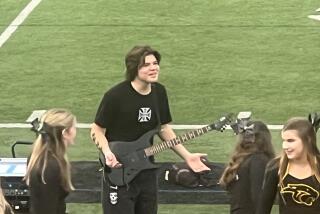When a Kid Wants to Toot His Own Horn, What’s Mom to Do?
- Share via
It had been a grueling few weeks. My 12-year-old son, Jarrod, an aspiring jazz trumpeter, was running the middle-school version of a musical gantlet. He’d been preparing for two concerts and an audition for the Southern California Honor Band. There was a jazz rehearsal on Saturday afternoon, followed by tests on how well he knew his scales--memorized, up to four flats and four sharps each. He’d be expected to know them for the audition. Next, run-throughs of his solo, “Bonita,” and then practice at sight-reading.
The Sunday morning audition was an arduous exercise of nerves, willpower and poise, which he pulled off well. He knew beforehand that his chances were iffy. He’d be one of the smallest and youngest auditioners. Size gives a sound advantage for brass players, an advantage he couldn’t yet claim. Plus, he’d gotten braces a few months earlier and had worked his lips raw trying to regain his embouchure and range. They were good, but not as good as before the braces.
After the audition, he had time for a quick bite of lunch, then off to the jazz concert where he improvised four pieces to the cavernous, nearly vacant concert hall. It was a sparse crowd of dutiful parents, hardly an unfamiliar face in the lot. Jarrod seemed to enjoy the performances, but something was gnawing at him. Monday night, he was back at it with the wind ensemble. Again, the same faces, all filled with rapt enthusiasm--but we’re the parents, of course we’re going to clap our hands numb.
And Jarrod knew it.
At his trumpet lesson the following day, his teacher decided he needed a break. Instead of working on serious music, they goofed off with a book of Christmas carols, playing “Jingle Bell Rock,” “Frosty the Snowman” and Jarrod’s favorite, a jazzy version of “Feliz Navidad,” making each other laugh. For fun, the teacher let Jarrod borrow the book of carols along with the CD accompaniment.
“All you need now is a Santa hat and you can make some money playing on Brand,” his teacher joked about the main boulevard a few blocks from our home in Glendale where a handful of street musicians gather on Friday and Saturday nights.
Jarrod laughed at the crack, said goodbye and left. I was a little surprised the next day when he came home from school with a Santa hat.
That evening, I knew something was up. Though Jarrod loves performing and rehearsing with a group, he hates practicing alone. I usually have to cajole him. This night he went straight to work without being asked. Soon, strains of “Let It Snow!” and “White Christmas” filled the house. When practice time was over, he didn’t quit. I actually had to interrupt the carol fest to remind him he still had homework to do.
For the next three days, the carols came fast and furious out of the bell of his trumpet, all played with the Santa hat in place, the boombox by his feet. Could we actually let him do what he was planning?
“How much do you think a street performer can earn in a night?” he asked after practicing for more than an hour.
“I don’t know,” I answered. “Why? Are you thinking about doing that?”
“Yeah. It would be kind of cool to play for people walking by, have them stop to watch for a bit. And I might make some money.”
Now I was starting to panic, stumped as to how to handle this. Could I let him perform on a street? A kid of 12? How many times had I taken in the strains of street music, happy for the ambience the musicians added? And yet, just as many times, I’d been embarrassed by the players I’d seen, moved to pity by their sad attempts. Would my son look pathetic? Worse, I wondered, is street performing the same as begging?
I didn’t sleep well that night with the pros and cons rolling around in my brain. He wants to play his music for others; that’s an admirable impulse. Yet, what will his presence on Brand, hat in hand, say about me as a mother? He kept practicing, and I kept hoping he’d get sidetracked and forget about it. I called the Glendale Police Department to find out about the legality. “A permit is required,” I was told. I heaved a sigh of relief. “But,” the official continued, “we don’t enforce that rule unless someone’s being a nuisance.” Strike two.
Time was running short. On the Sunday before Christmas, Jarrod announced he was ready. He’d practiced the songs and had worked up all his courage; I’d run out of excuses. “You’ll need batteries for the boombox,” I reminded him in a last-ditch effort to derail his plan. He borrowed $12 for batteries, put on his performance clothes and topped off the outfit with the Santa hat.
I wasn’t about to let him go alone. We walked to Brand, his trumpet and boombox in hand. I was beginning to wish I’d made a sign for myself: “I did not put him up to this.” He found a spot in front of a restaurant, arranged his things and adjusted his hat. For the first time, the reality of what he was about to do hit him. He looked panicked.
“Just let me wait a minute.”
“You don’t have to do this,” I reminded him.
A minute slipped by as he fingered the valves on his trumpet. Five more minutes. “I’m just going to do it,” he announced, his face pale next to the red hat. He pushed the CD button, put the trumpet to his lips and played. Tentative at first, but then strong and full.
People gathered. Not much of a crowd, but shoppers stopping for a song or two. A little boy, maybe 2, walked as close to the trumpet’s bell as he could get and stared in fascination. Jarrod played. And played. A little boy and girl came by and danced to “Frosty,” requesting the song again and again. People driving past honked and waved. A few teens stopped long enough to bob their heads to the beat.
A few parents looked at me with what seemed reproach; a few others grinned. Some tossed money into his case. As Jarrod played, a man came up to me. “My son used to play the trumpet,” he said. “It’s nice to see.” Jarrod played until his lips went rubbery and then played some more. A young man, who said he’d studied the trumpet for nine years, handed me a scrap of paper on which he’d written a list of CDs featuring outstanding trumpet players. “He might like these for Christmas,” he said, gesturing at Jarrod.
Two hours straight. Between songs, I could see his lips were getting swollen, but Jarrod didn’t notice. His repertoire dwindled to the four carols he could play without having to hit high notes and those he played endlessly. By 9 o’clock, he was ready to call it quits.
“Did you see those little kids dancing?” he asked as we walked home. “Their parents had to pull them away. They liked it!”
His face was beaming in a different way than after the concerts or auditions. The people who’d stopped to listen to him weren’t dutiful parents, music teachers or members of his extended family. They didn’t have to listen.
I made Jarrod hot chocolate as he changed for bed. “Aren’t you going to count your money?” I asked. Looking back on the evening, it struck me that he’d paid absolutely no attention to whether people were tossing in cash as he played. I’d have guessed he’d be calculating how many songs he’d have to play to earn a new Sony PlayStation game. He never even looked.
“So, you enjoyed it?” I asked.
“I liked how people smiled and nodded,” he said, dumping crumpled dollars and handfuls of change onto the kitchen table. “They seemed happy hearing me play.”
It hadn’t been the cash after all, I realized. It was the little kids dancing. The thumbs-up shoppers offered as they walked past. The fact that complete strangers had stopped their busy lives to listen to his music.
On the table he made piles of dollar bills, a stack of quarters, little towers of nickels and dimes, a hot chocolate smile staining his upper lip. I was hoping he’d earned just enough to repay the loan for the batteries and his career as a street performer would be over.
A grin split his face as he announced the total: “Fifty dollars and 6 cents.” He leaped up and danced around the kitchen; I nearly collapsed. “That’s as much as I get for birthday money!” he sang. “Can I go back tomorrow night?”
So it wasn’t the cash that had motivated him, but I guess it didn’t hurt.
More to Read
The biggest entertainment stories
Get our big stories about Hollywood, film, television, music, arts, culture and more right in your inbox as soon as they publish.
You may occasionally receive promotional content from the Los Angeles Times.










